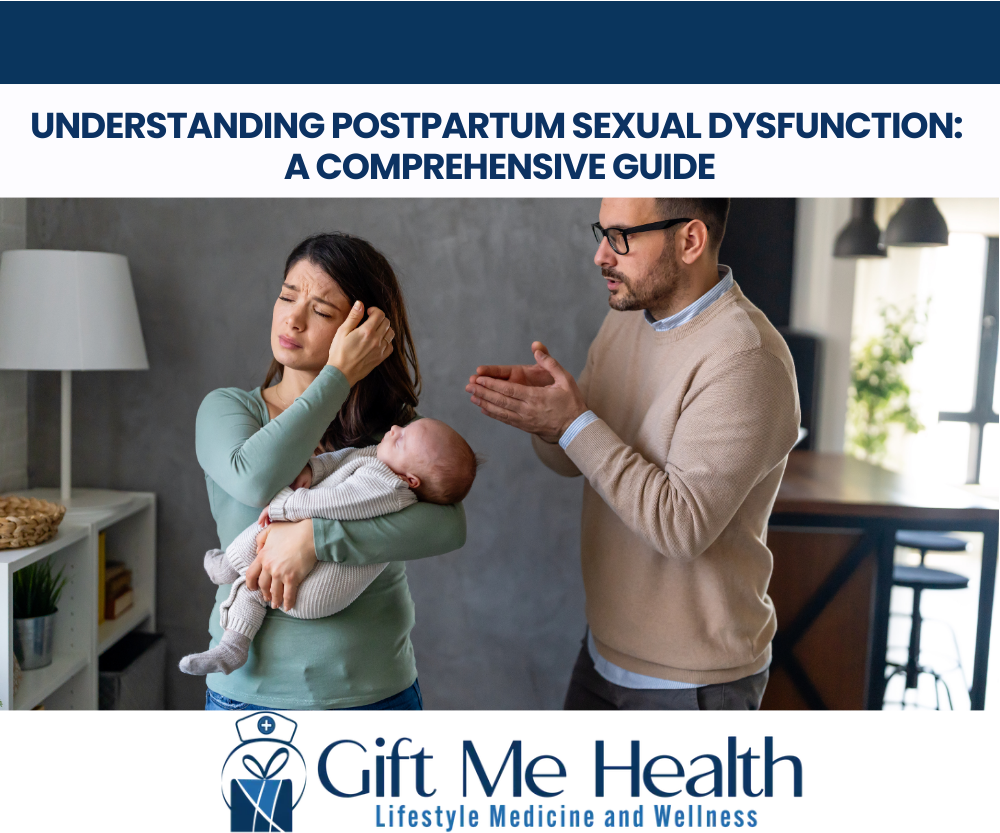 Bringing a new life into the world is an incredible journey filled with joy and challenges. However, for many women, the postpartum period can bring unexpected physical and emotional changes, including postpartum sexual dysfunction.
Bringing a new life into the world is an incredible journey filled with joy and challenges. However, for many women, the postpartum period can bring unexpected physical and emotional changes, including postpartum sexual dysfunction.
At Gift Me Health Lifestyle Medicine and Wellness, we are committed to providing holistic care and support for new mothers navigating these changes. This comprehensive guide aims to shed light on postpartum sexual dysfunction, its causes, symptoms, and available treatments, along with a detailed Q&A section to address common concerns.
What is Postpartum Sexual Dysfunction?
Postpartum sexual dysfunction refers to difficulties in sexual function that arise after childbirth. These difficulties can affect various aspects of sexual health, including desire, arousal, lubrication, orgasm, and pain during intercourse. It’s a common issue that many women experience, yet it often remains unspoken due to feelings of embarrassment or lack of awareness.
Causes of Postpartum Sexual Dysfunction
Several factors can contribute to postpartum sexual dysfunction, including:
- Hormonal Changes: After childbirth, estrogen levels drop significantly, which can lead to vaginal dryness and decreased libido.
- Physical Changes: The process of childbirth can cause physical trauma, such as perineal tears or episiotomies, which may result in pain during intercourse.
- Breastfeeding: Prolactin, the hormone responsible for milk production, can suppress estrogen, further contributing to vaginal dryness and reduced sexual desire.
- Fatigue and Stress: Caring for a newborn is exhausting and can lead to physical and emotional stress, impacting sexual desire and function.
- Emotional Factors: Postpartum depression and anxiety can affect overall well-being and sexual health.
- Body Image: Changes in body shape and weight after pregnancy can affect self-esteem and sexual confidence.
Symptoms of Postpartum Sexual Dysfunction
Common symptoms include:
- Reduced sexual desire
- Difficulty achieving arousal
- Vaginal dryness
- Pain during intercourse (dyspareunia)
- Difficulty achieving orgasm
- Emotional distress related to sexual activity
Treatment Options
- Communication: Open and honest communication with your partner about your feelings and experiences is crucial.
- Lubricants: Over-the-counter lubricants can help alleviate vaginal dryness and reduce discomfort during intercourse.
- Pelvic Floor Exercises: Kegel exercises can strengthen the pelvic floor muscles, improving sexual function and reducing pain.
- Therapy: Counseling or sex therapy can help address emotional and psychological factors.
- Medical Interventions: In some cases, hormonal treatments or physical therapy may be recommended.
- Self-Care: Prioritizing self-care and rest can help manage stress and improve overall well-being.
Q&A Section
Q1: How long does postpartum sexual dysfunction last?
A1: The duration of postpartum sexual dysfunction varies from woman to woman. For some, symptoms may resolve within a few months, while others may experience them for a year or longer. It’s important to seek help if symptoms persist.
Q2: Is it normal to have a decreased libido after childbirth?
A2: Yes, it’s normal to experience a decrease in libido after childbirth due to hormonal changes, fatigue, and stress. This is a common experience for many new mothers.
Q3: Can breastfeeding affect my sexual health?
A3: Yes, breastfeeding can affect sexual health due to increased prolactin levels, which can suppress estrogen and lead to vaginal dryness and reduced libido. These effects are usually temporary.
Q4: What can I do to reduce pain during intercourse?
A4: Using lubricants, engaging in extended foreplay, practicing pelvic floor exercises, and ensuring adequate time for healing postpartum can help reduce pain during intercourse. Consult a healthcare provider if pain persists.
Q5: When is it safe to resume sexual activity after childbirth?
A5: Most healthcare providers recommend waiting at least six weeks after childbirth to resume sexual activity, but this can vary depending on individual circumstances. Always consult with your healthcare provider before resuming sexual activity.
Q6: Can pelvic floor exercises really help with sexual dysfunction?
A6: Yes, pelvic floor exercises can strengthen the pelvic muscles, improve blood flow, and enhance sexual function. They are a simple yet effective way to address postpartum sexual dysfunction.
Q7: Should I talk to my doctor about postpartum sexual dysfunction?
A7: Absolutely. It’s important to discuss any concerns about postpartum sexual dysfunction with your healthcare provider. They can offer guidance, support, and treatment options tailored to your needs.
Conclusion
Postpartum sexual dysfunction is a common and often treatable condition. At Gift Me Health Lifestyle Medicine and Wellness, we are dedicated to providing comprehensive care and support for new mothers experiencing these challenges. Remember, you are not alone, and seeking help is a positive step toward improving your sexual health and overall well-being. If you have any questions or need support, please don’t hesitate to reach out to our team of experts.




